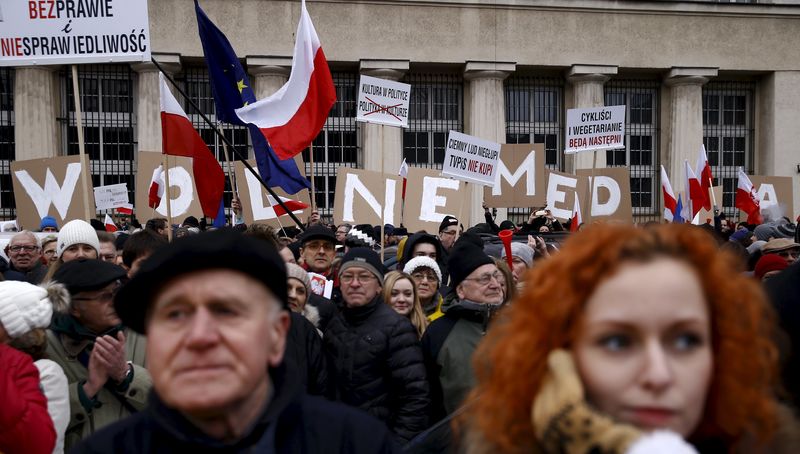By Paul Taylor
BRUSSELS (Reuters) - The European Commission aims to raise pressure on Poland when it debates the new Eurosceptic government's crackdown on the constitutional court and public broadcasters on Wednesday, a senior EU source said.
However, the European Union executive, keen to avoid accusations of "Poland-bashing", may hold fire for now on triggering a disciplinary mechanism that could eventually lead to sanctions against Warsaw, he said.
Instead, it may seek further explanations and commitments from Poland in talks and in writing before any formal decision.
Commission spokesman Margaritis Schinas told a news briefing: "Following the recent developments in Poland, the commissioners will hold an orientation debate on the situation in Poland and the EU rule of law framework."
"This discussion should serve as a basis to proceed with a deeper assessment of the situation in a constructive dialogue with the Polish authorities."
Critics accuse Polish nationalist leader Jaroslaw Kaczynski of seeking to stifle judicial independence and freedom of speech and impose his Law and Justice (PiS) party's conservative views. Supporters say the government is entitled to uphold Catholic and national values and show its independence from Brussels.
After being widely accused of failing to defend European liberal values against an authoritarian crackdown by Hungarian Prime Minister Viktor Orban since 2010, the EU created a new legal instrument known as the "rule of law framework" in 2014.
The three-stage process provides a means of pressuring a country to amend its action before Brussels applies the "nuclear option" of suspending its EU voting rights and access to EU funds in case of a "systemic threat" to the rule of law.
Orban said last week he would veto any attempt to impose sanctions on Warsaw. Commission President Jean-Claude Juncker said he did not expect things would reach that point with Poland, suggesting EU concerns about the government's actions could be resolved through dialogue.
Adding its voice to calls for action, an EU regulatory body called for action to safeguard media independence in the bloc's largest eastern member state.
"These recent developments, and the expressed intentions of the Polish government to influence the programming of public broadcasters, raise serious concerns about the safeguarding of independent media in the European Union," said the European Regulators Group for Audivisual Media Services.
"SPOTLIGHT ON WARSAW"
On Wednesday, the commissioners in charge of fundamental rights, justice and media - Frans Timmermans, Vera Jourova and Gunther Oettinger - will report to the 28-member Commission on the Polish measures before the college decides how to proceed.
The Polish government will not be represented, but Polish Commissioner Elzbieta Bienkowska, nominated by the previous liberal, pro-European government, will also speak.
"The spotlight will continue to be on Warsaw. We don't want to switch off the spotlight," the EU source said.
He played down a report by Germany's Frankfurter Allgemeine Zeitung that commissioners' chiefs of staff, at a preparatory meeting last Friday, had agreed the Commission should trigger the new mechanism for the first time, launching an in-depth audit of Poland's adherence to the rule of law.
The EU debate comes amid deteriorating relations between Poland and Germany over the new Warsaw government's measures.
Poland summoned the German ambassador to the foreign ministry on Sunday to complain of critical comments by two German politicians who work for EU institutions - Commissioner Oettinger and European Parliament President Martin Schulz.
Both sides said the meeting was constructive, and Polish Deputy Prime Minister Mateusz Morawiecki said on Monday: "There is a lot of noise about it and a storm in a teacup."
He advised German politicians to focus on Berlin's domestic problem of "the excesses with immigrants" and keep quiet about Poland, adding that he saw no cooling in German-Polish ties.
A German spokesman said Berlin was not considering sanctions on Warsaw despite a weekend comment by the floor leader of Chancellor Angela Merkel's conservatives, Volker Kauder, that EU states should have "the courage to impose sanctions" if the crackdown on media and judiciary violated European values.
Since its election victory in October, the PiS government has ignored existing rules to pack the constitutional court with its appointees and changed the court's voting system to curb its ability to censure legislation. It has also passed a law giving it direct control over the appointment of public media chiefs.
An EU diplomat said Warsaw regarded itself as being safe from any legal action by the Commission.
"Nobody on the Polish government side seems to believe that any procedure can be launched against Warsaw. Because Poland is more important than Hungary ... but also because if you drop the nuclear bomb now, there is nothing left for the future, no other means of pressure," the diplomat said.
Other diplomats said any action by Brussels could be politically counterproductive, fuelling Eurosceptic forces in central Europe and a "siege mentality" in Poland.

A boycott by other EU governments in 2000 of high-level contacts with Austria after an extreme-right party led by Joerg Haider joined the government there backfired, by bolstering the coalition's popularity. It was dropped the following year, although the affair helped convince EU leaders to adopt the existing legal measures allowing for suspension.